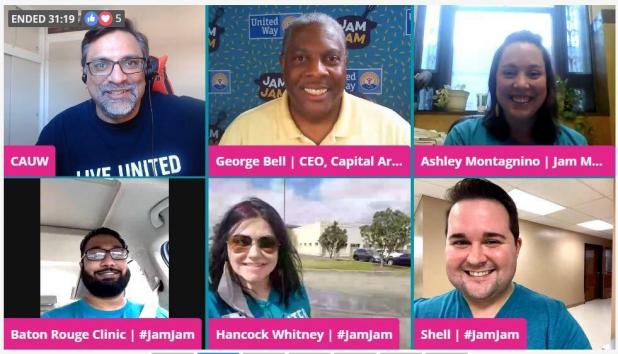
Screen Capture from Capital Area United Way
The Capital Area United Way conducts an online meeting to announce plans for an online version of its annual Jambalaya Festival.
Disasters, pandemic hurt nonprofit fundraising
While it’s been a rough year for a lot of people, 2020 has been especially tough in southwest Louisiana.
On top of the pandemic and recession the rest of the world has been dealing with, the region anchored by Lake Charles was hit by two major hurricanes this year, including Hurricane Laura, a 150-mile-per-hour beast and the strongest storm on record to make landfall in Louisiana.
Sara Judson, CEO of the Community Foundation of Southwest Louisiana, vividly recalls receiving one of the first post-Laura donations. She opened mail with a New York state postmark and unwrapped some brown paper with “Hurricane Laura relief” written on it to find an envelope containing three one-dollar bills. Someone who probably doesn’t have much money to spare wanted to chip in.
COVID-19 and the associated economic downturn have strained nonprofits that serve people who already were struggling before the pandemic. The coronavirus that causes the illness and the restrictions on large in-person events imposed to help control its spread have caused many nonprofits to cancel fundraising events or shift them to the internet. Mix in a record-breaking hurricane season, and Louisiana’s charity sector is facing acute needs while simultaneously rethinking their business models.
McKinsey & Company performed a free study and found more than a quarter of the housing in southwest Louisiana’s Calcasieu Parish was uninhabitable, Judson said. The federal government ultimately will pay for much of the region’s physical damage, but there’s always a gap, which is where the nonprofits Judson’s foundation works with come in, she said.
Beyond critical needs like housing lie smaller challenges. The Salvation Army in Lake Charles each Christmas provides gifts for needy children. Normally, they serve 800 children; this year, they had requests for 5,300 children, Judson said. Unlike prior years, locals might not be able to help everyone.
But despite the hardships people are facing worldwide, donors from every U.S. state and 10 foreign countries have donated more than $6 million to the foundation’s hurricane recovery fund since Laura made landfall, Judson said. The foundation distributes the money to area nonprofits working on immediate needs and long-term recovery, she said.
Perhaps surprisingly, charitable giving is up nationwide, the Association of Fundraising Professionals’ Fundraising Effectiveness Project reports. Charitable giving grew by 7.6 percent during the first nine months of 2020 compared to the same period in 2019, according to the project’s third-quarter report.
The only area of significant decline was in the number of new repeat donors – donors who gave for the first time to a charity in 2019 but haven’t given again to the same charity in 2020 so far – which was down 10.3 percent. It’s likely that many new donors last year are switching their giving to pandemic relief organizations, which would account for the drop in new repeat donors and an increase in the number of new donors, project chairman Joe Biedermann said.
“What we’re seeing is that people remain very generous and continue to support their neighbors, communities and charitable causes when they face crises and hard times,” he said.
George Bell, president and CEO of Capital Area United Way in Baton Rouge, is watching two main factors to measure his organization’s progress raising money. He said collections of pledges made during the previous fundraising year are up about 2 percent.
Bell said it’s too early to say how well their current pledge cycle will go. Right now, they’re slightly behind last year, mostly because many workplace campaigns have started late.
At least eight companies have said they don’t feel comfortable running a workplace campaign this year. Some other nonprofit organizations are down by as much as 40 percent, Bell said.
Groups that rely heavily on in-person events are in the toughest position. Capital Area United Way converted its annual jambalaya cook-off, normally a downtown festival with live music, to a virtual event. They raised about $87,000, compared to more than $150,000 last year, Bell said.
CAUW and the Baton Rouge Area Foundation this year organized 225 Gives, an online fundraising event to support the region’s nonprofit community. The campaign raised more than $2.8 million, according to preliminary numbers CAUW reported on its website, falling short of the $4.25 million goal.
“We really have a perfect storm happening right now,” philanthropy consultant Beverly Brooks Thompson said.
How potential donors feel about their finances is just as important as the reality, she said. Economic and political uncertainty can cause people to hold back even if they are not personally experiencing hardship.
While tax benefits usually aren’t the main reason people give, Thompson said, federal tax policy changes implemented in 2017 may discourage some potential donors because with a larger standard deduction, people have to give more to get a tax break.
Thompson said she has been telling clients for years that depending on events is not sustainable because it’s “transactional.” Now more than ever, nonprofits that form strong relationships with their donors and communicate their needs and results will have the best chance to thrive, she said.
“People are either generous or they are not; it has nothing to do with wealth,” Thompson added. “We happen to live in an extraordinarily philanthropic state, which is poor. We help our neighbors out.”
